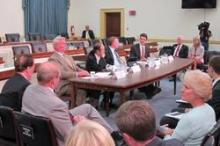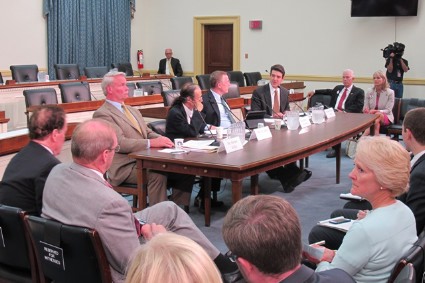User login
WASHINGTON – People with serious mental illness need more attention, including involuntary treatment, advocates said at a hearing to push a wide-ranging bill that addresses issues around the hardest-to-reach patients.
The bill, H.R. 3717, was introduced in December by Rep. Tim Murphy, (R-Penn.), a clinical psychologist and chairman of the Oversight and Investigations Subcommittee of the Energy & Commerce Committee.
Rep. Murphy said people with serious and persistent mental illness – including severe bipolar disorder and schizophrenia – are not being well served.
An almost-2-year investigation by the subcommittee "reveals that the current mental health system does not respond until after a crisis has already occurred because we do not empower parents, patients, clinicians, and law enforcement to stop it from happening," he said at the hearing.
He cited a recent list of those with severe mental illness who had undertreated or untreated disease, including Elliot Rodger, who killed 6 people and himself in Isla Vista, Calif.; Adam Lanza, who, in 2012, killed 20 children, 6 adults, his mother, and himself in Newtown, Conn.; and Aaron Alexis, who went on a shooting spree in September 2013 at the Navy Yard in Washington and killed 12 people, then killed himself.
Treatment might help prevent violent episodes, Rep. Murphy said. In the subcommittee report, Rep. Murphy and his staff noted that the Substance Abuse and Mental Health Services Administration (SAMHSA) estimated that in 2009, 40% of adults with serious mental illness reported not receiving any treatment. It takes an average of 110 weeks between the onset of symptoms and an individual’s entering into treatment, according to the letter.
Rep. Murphy’s bill – the Helping Families in Mental Health Crisis Act – seeks to create a new infrastructure to focus on serious mental illness. It also takes issue with how SAMHSA is being administered and how it decides on grantees.
A new assistant secretary for mental health and substance use disorders would oversee the SAMHSA administrator, and establish a National Mental Health Policy Laboratory to more closely supervise SAMHSA grantees and make sure that they undertook evidence-based projects. New telepsychiatry and primary care physician training grants would be provided to states to promote the use of telehealth. The bill would allow caregivers to get access to protected health information, when the patient’s provider reasonably believes it is necessary for that information to be made available to protect the individual’s health, safety, or welfare or the safety of one or more other individuals – even it the patient has not consented to disclosure.
After the bill was introduced last year, the American Psychiatric Association wrote a letter to Rep. Murphy praising the comprehensive nature of the package and its emphasis on providing evidence-based services.
At the hearing, Edward F. Kelly III, the father of an adult son with schizophrenia, said HIPAA had prevented him and his wife from getting information on their son’s treatment, hospitalizations, releases, encounters with the legal system, and whereabouts.
He chided organizations that he said were advocating against involuntary treatment of people with severe mental illness. Mr. Kelly urged Congress to support Rep. Murphy’s bill.
"Don’t fear the threats of unconstitutionality. Don’t fear the threats of lawsuits," he said.
Mr. Kelly urged Congress to support assisted outpatient treatment, known as AOT. D.J. Jaffe, founder of Mental Illness Policy Org., said that AOT – which allows courts to order patients into outpatient treatment in the community – reduces violence, incarceration, and homelessness. Many of those with severe mental illness are not aware that they need help, he said. "They are never going to volunteer for treatment," Mr. Jaffe said. "We have to recognize this reality."
AOT is "an off-ramp before jail," he said. "It’s like putting a fence at the edge of the cliff, rather than an ambulance at the bottom."
Rep. Murphy’s bill has 87 cosponsors. There is no companion bill in the Senate.
On Twitter @aliciaault
WASHINGTON – People with serious mental illness need more attention, including involuntary treatment, advocates said at a hearing to push a wide-ranging bill that addresses issues around the hardest-to-reach patients.
The bill, H.R. 3717, was introduced in December by Rep. Tim Murphy, (R-Penn.), a clinical psychologist and chairman of the Oversight and Investigations Subcommittee of the Energy & Commerce Committee.
Rep. Murphy said people with serious and persistent mental illness – including severe bipolar disorder and schizophrenia – are not being well served.
An almost-2-year investigation by the subcommittee "reveals that the current mental health system does not respond until after a crisis has already occurred because we do not empower parents, patients, clinicians, and law enforcement to stop it from happening," he said at the hearing.
He cited a recent list of those with severe mental illness who had undertreated or untreated disease, including Elliot Rodger, who killed 6 people and himself in Isla Vista, Calif.; Adam Lanza, who, in 2012, killed 20 children, 6 adults, his mother, and himself in Newtown, Conn.; and Aaron Alexis, who went on a shooting spree in September 2013 at the Navy Yard in Washington and killed 12 people, then killed himself.
Treatment might help prevent violent episodes, Rep. Murphy said. In the subcommittee report, Rep. Murphy and his staff noted that the Substance Abuse and Mental Health Services Administration (SAMHSA) estimated that in 2009, 40% of adults with serious mental illness reported not receiving any treatment. It takes an average of 110 weeks between the onset of symptoms and an individual’s entering into treatment, according to the letter.
Rep. Murphy’s bill – the Helping Families in Mental Health Crisis Act – seeks to create a new infrastructure to focus on serious mental illness. It also takes issue with how SAMHSA is being administered and how it decides on grantees.
A new assistant secretary for mental health and substance use disorders would oversee the SAMHSA administrator, and establish a National Mental Health Policy Laboratory to more closely supervise SAMHSA grantees and make sure that they undertook evidence-based projects. New telepsychiatry and primary care physician training grants would be provided to states to promote the use of telehealth. The bill would allow caregivers to get access to protected health information, when the patient’s provider reasonably believes it is necessary for that information to be made available to protect the individual’s health, safety, or welfare or the safety of one or more other individuals – even it the patient has not consented to disclosure.
After the bill was introduced last year, the American Psychiatric Association wrote a letter to Rep. Murphy praising the comprehensive nature of the package and its emphasis on providing evidence-based services.
At the hearing, Edward F. Kelly III, the father of an adult son with schizophrenia, said HIPAA had prevented him and his wife from getting information on their son’s treatment, hospitalizations, releases, encounters with the legal system, and whereabouts.
He chided organizations that he said were advocating against involuntary treatment of people with severe mental illness. Mr. Kelly urged Congress to support Rep. Murphy’s bill.
"Don’t fear the threats of unconstitutionality. Don’t fear the threats of lawsuits," he said.
Mr. Kelly urged Congress to support assisted outpatient treatment, known as AOT. D.J. Jaffe, founder of Mental Illness Policy Org., said that AOT – which allows courts to order patients into outpatient treatment in the community – reduces violence, incarceration, and homelessness. Many of those with severe mental illness are not aware that they need help, he said. "They are never going to volunteer for treatment," Mr. Jaffe said. "We have to recognize this reality."
AOT is "an off-ramp before jail," he said. "It’s like putting a fence at the edge of the cliff, rather than an ambulance at the bottom."
Rep. Murphy’s bill has 87 cosponsors. There is no companion bill in the Senate.
On Twitter @aliciaault
WASHINGTON – People with serious mental illness need more attention, including involuntary treatment, advocates said at a hearing to push a wide-ranging bill that addresses issues around the hardest-to-reach patients.
The bill, H.R. 3717, was introduced in December by Rep. Tim Murphy, (R-Penn.), a clinical psychologist and chairman of the Oversight and Investigations Subcommittee of the Energy & Commerce Committee.
Rep. Murphy said people with serious and persistent mental illness – including severe bipolar disorder and schizophrenia – are not being well served.
An almost-2-year investigation by the subcommittee "reveals that the current mental health system does not respond until after a crisis has already occurred because we do not empower parents, patients, clinicians, and law enforcement to stop it from happening," he said at the hearing.
He cited a recent list of those with severe mental illness who had undertreated or untreated disease, including Elliot Rodger, who killed 6 people and himself in Isla Vista, Calif.; Adam Lanza, who, in 2012, killed 20 children, 6 adults, his mother, and himself in Newtown, Conn.; and Aaron Alexis, who went on a shooting spree in September 2013 at the Navy Yard in Washington and killed 12 people, then killed himself.
Treatment might help prevent violent episodes, Rep. Murphy said. In the subcommittee report, Rep. Murphy and his staff noted that the Substance Abuse and Mental Health Services Administration (SAMHSA) estimated that in 2009, 40% of adults with serious mental illness reported not receiving any treatment. It takes an average of 110 weeks between the onset of symptoms and an individual’s entering into treatment, according to the letter.
Rep. Murphy’s bill – the Helping Families in Mental Health Crisis Act – seeks to create a new infrastructure to focus on serious mental illness. It also takes issue with how SAMHSA is being administered and how it decides on grantees.
A new assistant secretary for mental health and substance use disorders would oversee the SAMHSA administrator, and establish a National Mental Health Policy Laboratory to more closely supervise SAMHSA grantees and make sure that they undertook evidence-based projects. New telepsychiatry and primary care physician training grants would be provided to states to promote the use of telehealth. The bill would allow caregivers to get access to protected health information, when the patient’s provider reasonably believes it is necessary for that information to be made available to protect the individual’s health, safety, or welfare or the safety of one or more other individuals – even it the patient has not consented to disclosure.
After the bill was introduced last year, the American Psychiatric Association wrote a letter to Rep. Murphy praising the comprehensive nature of the package and its emphasis on providing evidence-based services.
At the hearing, Edward F. Kelly III, the father of an adult son with schizophrenia, said HIPAA had prevented him and his wife from getting information on their son’s treatment, hospitalizations, releases, encounters with the legal system, and whereabouts.
He chided organizations that he said were advocating against involuntary treatment of people with severe mental illness. Mr. Kelly urged Congress to support Rep. Murphy’s bill.
"Don’t fear the threats of unconstitutionality. Don’t fear the threats of lawsuits," he said.
Mr. Kelly urged Congress to support assisted outpatient treatment, known as AOT. D.J. Jaffe, founder of Mental Illness Policy Org., said that AOT – which allows courts to order patients into outpatient treatment in the community – reduces violence, incarceration, and homelessness. Many of those with severe mental illness are not aware that they need help, he said. "They are never going to volunteer for treatment," Mr. Jaffe said. "We have to recognize this reality."
AOT is "an off-ramp before jail," he said. "It’s like putting a fence at the edge of the cliff, rather than an ambulance at the bottom."
Rep. Murphy’s bill has 87 cosponsors. There is no companion bill in the Senate.
On Twitter @aliciaault
EXPERT ANALYSIS AT AN ENERGY & COMMERCE SUBCOMMITTEE HEARING

